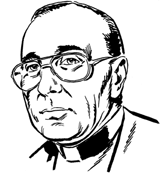
 DAVID HOPE
DAVID HOPEArchbishop of York
David Hope probably ruled himself out for the job in 1995, when he was Bishop of London, by an act of remarkable courage and dignity.
He called a press conference to discuss his own sexuality – after a long period of fencing with Outrage! who were then stalking the bishops – and announced that his own sexuality was "a grey area," but that "from the beginning I have sought to lead a celibate life and I am perfectly happy and content."
If the statement had an ambiguous content in one way (no one then or since has publicly explored the difference between trying and succeeding), it was also an unambiguous demonstration of peculiarly awkward courage under fire, rewarded nine months later with the See of York, which was the summit of his ambitions.
Hope wanted to be a priest from childhood, when the story is told of him, as of other Catholic bishops, that he would dress up as one and play games with a little altar. He is in the mainstream of Anglo-Catholicism, in a way in which the other opponent of women priests on this list, Richard Chartres, is not. Many people suspect, I think wrongly, that Chartres could drop his opposition to women if it were all that stood between him and Canterbury. It is impossible to imagine Hope doing so.
On the other hand, the world of Anglo-Catholicism to which he belongs has drifted further and further from the mainstream of the Church of England since the decision to ordain women. The fact that he is so clearly identified with one minority party is a fairly clear disqualification for the job as leader or bell-wether of an international communion in which his party is more or less defined by their separation from the mainstream. This would remain so even without the grey areas in his personality.
As leaders of minority parties go, you could not get better than Hope, though. He is admired even by opponents for honesty and holiness and respected as well as admired by those on his side. However, he is quite without charisma. His qualities emerge from the negative, as it were: for a man so unassuming and earnest to make the mark that he has done, there must be a great deal going on that is invisible to the profane eye.
He is hard-working both to his priests and to the Church of England as he understands it. His principles are clear, to the extent that that can be said of anyone who subscribes to the Act of Synod, and I have never heard anyone but Peter Tatchell speak bitterly of him, or even angrily.
Top of Page | Next Archbishop | Archive | SOF Home
Illustration: John Richardson / Funny Business
© Ship of Fools 2000